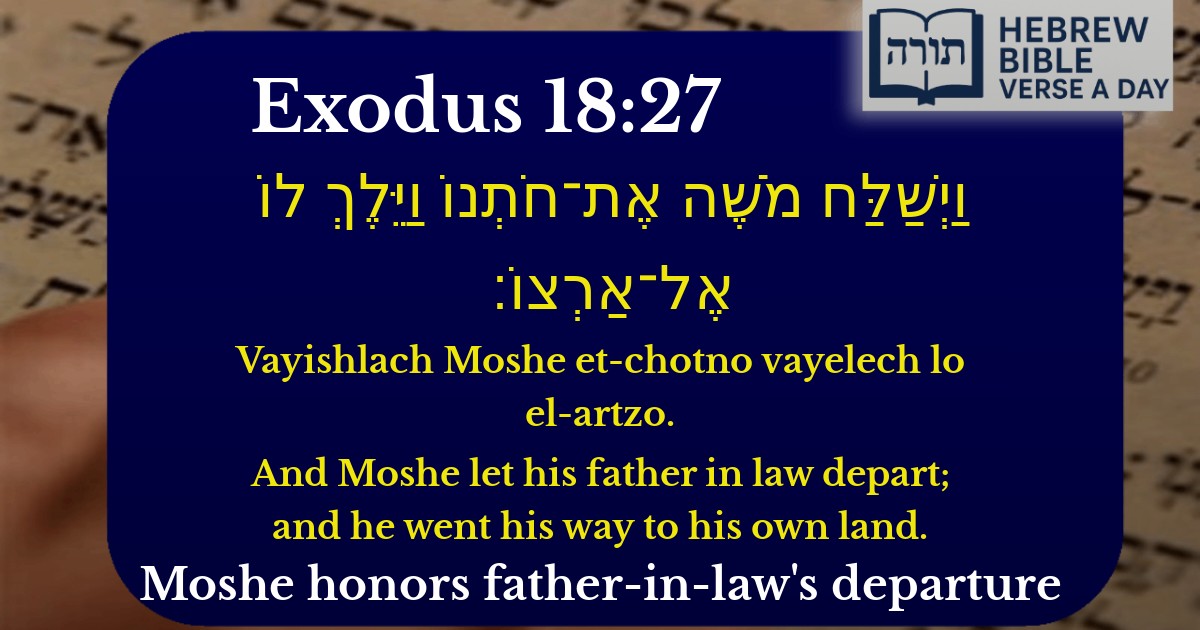Join Our Newsletter To Be Informed When New Videos Are Posted
Join the thousands of fellow Studends who rely on our videos to learn how to read the bible in Hebrew for free!
Hebrew Text
וַיְשַׁלַּח מֹשֶׁה אֶת־חֹתְנוֹ וַיֵּלֶךְ לוֹ אֶל־אַרְצוֹ׃
English Translation
And Moshe let his father in law depart; and he went his way to his own land.
Transliteration
Vayishlach Moshe et-chotno vayelech lo el-artzo.
Hebrew Leining Text
וַיְשַׁלַּ֥ח מֹשֶׁ֖ה אֶת־חֹתְנ֑וֹ וַיֵּ֥לֶךְ ל֖וֹ אֶל־אַרְצֽוֹ׃ <span class="mam-spi-pe">{פ}</span><br>
וַיְשַׁלַּ֥ח מֹשֶׁ֖ה אֶת־חֹתְנ֑וֹ וַיֵּ֥לֶךְ ל֖וֹ אֶל־אַרְצֽוֹ׃ {פ}
🎵 Listen to leining
Parasha Commentary
📚 Talmud Citations
This verse is quoted in the Talmud.
📖 Sanhedrin 106a
The verse is referenced in a discussion about the departure of Yitro (Jethro), Moses' father-in-law, and his return to his own land, illustrating the narrative context of their separation.


Commentary on Shemot (Exodus) 18:27
The verse states: "וַיְשַׁלַּח מֹשֶׁה אֶת־חֹתְנוֹ וַיֵּלֶךְ לוֹ אֶל־אַרְצוֹ" ("And Moshe let his father-in-law depart; and he went his way to his own land"). This follows Yitro's advice to Moshe about establishing a judicial system (Shemot 18:13-26).
Rashi's Explanation
Rashi (on Shemot 18:27) notes that Yitro's departure was לכבדו ("to honor him"). He explains that Yitro did not want to leave while the Jewish people were in distress (during their travels in the wilderness), but once they were settled and at peace, he departed so as not to burden them with his presence. This reflects Yitro's humility and consideration for Bnei Yisrael.
Midrashic Insights
Halachic and Ethical Lessons
Rambam (Hilchos De'os 6:1) derives from this episode the importance of הליכת שלום ("departing in peace"). Just as Moshe honored Yitro by allowing him to leave with dignity, we must ensure that parting from others—whether guests, friends, or family—is done with respect and goodwill.
Symbolic Interpretation
The Kli Yakar observes that Yitro's return to his land signifies that true converts (גרי צדק) like Yitro maintain a connection to their roots while embracing Torah. His departure was not a rejection of Bnei Yisrael but an affirmation of his role in spreading monotheism beyond the Jewish people.